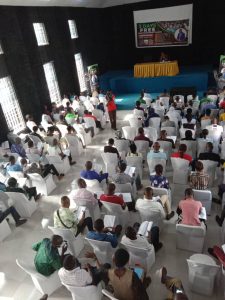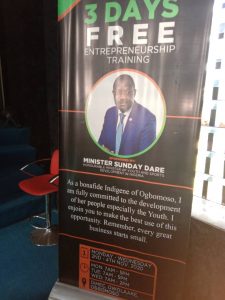Featured
Minister charges youth to take advantage of 3-days Entrepreneurship training.

My heart radiates with happiness to see the number of participants under the various youth groups in Ogbomoso and environs that have turned up here today to take part in this capacity building. It is a testimony to the fact that there is a yearning among our youth to upskill themselves when the opportunity is presented to them. Furthermore, the number of participants here is an indication that the youth realize they need to acquire the added advantage, which is the additional skills, different from their original courses of study, to thrive in a world that has become increasingly more digital, entrepreneurship oriented and competitive.
It is in response to these realities that the Ministry of Youth and Sports Development, which I oversee, has introduced the DEEL initiative, which is Digital Skills acquisition, Internship, Employability, and Leadership. Youth from across the country are already benefitting from pieces of a training run in conjunction with partners like IMB, Microsoft, and Google.

The Federal Government has taken the additional step of equipping youth to start and own their own businesses with the establishment of the Nigeria Youth Investment Fund (NYIF). It is a ringfenced N75 billion naira for bankable youth ideas and businesses at a 5% interest rate with a moratorium of up to 12 months.
It is my desire to see the youth here in Ogbomoso, in Oyo state, and all over Nigeria key into these initiatives and turn themselves into employers of labor, wealth creators, and entrepreneurs. I, therefore, want you to take advantage of this three-day training to join those that will grow Nigeria’s economy to an enviable position in the years ahead.
I urge you to listen and learn for the duration of the training and thereafter. Use this crucial training as a launchpad that will ensure that you are able to set up small scale enterprise that can grow and expand into world brands.
No man that doesn’t have a story, the story of some of you have begun today in terms of owning your personal small scale business. That is why we are urging you to try and take the opportunities that have been brought to your doorsteps seriously. The journey of a thousand miles starts with a step.

You have already taken the bold steps already to have come and participated in this capacity building. I said this because some youth are still out there who doubt that this program is not true. They didn’t come to participate not because they are not interested but because they fail to believe in the reality of life.
It is my priority as the Minister of Youth development in this country to ensure that we empower the youth and equip you with the necessary facilities that would bring about betterment to your future.
This is one of the reasons why we have set up this program. And the first sets of youth to benefit from this program are the youth of this ancient city of Ogbomoso.
While wishing you a fruitful and successful training ahead, I wish to urge you all once again to take advantage of this important training. I know you are intelligent, I know you are innovative and hardworking, you are just waiting for this opportunity to come and the opportunity is right before you, kindly take advantage of it. It is my dream that you all would excel in the field you have chosen in this 3-days capacity building program, either in the Fishery, Piggery, or the confectionaries. I am very optimistic that some of you will start telling your stories of your journey to stardom soon.
Thank you all.
Featured
NELFUND: The Renewed Hope Engine Propelling Nigeria’s Youth into Tomorrow

By Dayo Israel, National Youth Leader, APC
As the National Youth Leader of the All Progressives Congress, I have spent most of my tenure fighting for a Nigeria where every young person, regardless of their ward or local government, family income, or circumstance, can chase dreams without the chains of financial despair.
Today, that fight feels like victory, thanks to the Nigerian Education Loan Fund (NELFUND). Launched as a cornerstone of President Bola Ahmed Tinubu’s Renewed Hope Agenda, this initiative isn’t just a policy tweak; it’s a revolution. And under the steady, visionary hand of Managing Director Akintunde Sawyerr, NELFUND has transformed from a bold promise into a roaring engine of opportunity, disbursing over ₦116 billion to more than 396,000 students and shattering barriers for over a million applicants.
Let’s be clear: NELFUND was always destined to be a game-changer. Signed into law by President Tinubu on April 3, 2024, it repealed the outdated 2023 Student Loan Act, replacing it with a modern, inclusive framework that covers tuition, upkeep allowances, and even vocational training—ensuring no Nigerian youth is left on the sidelines of progress.
But what elevates it from groundbreaking to generational? Leadership. Enter Akintunde Sawyerr, the diplomat-turned-executioner whose career reads like a blueprint for results-driven governance. From co-founding the Agricultural Fresh Produce Growers and Exporters Association of Nigeria (AFGEAN) in 2012—backed by icons like former President Olusegun Obasanjo and Dr. Akinwumi Adesina—to steering global logistics at DHL across 21 countries, Sawyerr brings a rare alchemy: strategic foresight fused with unyielding accountability.
As NELFUND’s pioneer MD, he’s turned a fledgling fund into a finely tuned machine, processing over 1 million applications since May 2024 and disbursing ₦116 billion—₦61.33 billion in institutional fees and ₦46.35 billion in upkeep—to students in 231 tertiary institutions nationwide. That’s not bureaucracy; that’s brilliance.
Sawyerr’s touch is everywhere in NELFUND’s ascent. Since the portal’s launch, he’s overseen a digital ecosystem that’s as transparent as it is efficient—seamless verification, BVN-linked tracking, and real-time dashboards that have quashed misinformation and built trust. In just 18 months, the fund has empowered 396,252 students with interest-free loans, many first-generation learners who might otherwise have dropped out.
Sensitization drives in places like Ekiti and Ogun have spiked applications — 12,000 in a single day in one instance, while expansions to vocational centers in Enugu pilot the next wave of skills-based funding. And amid challenges like data mismatches and fee hikes, Sawyerr’s team has iterated relentlessly: aligning disbursements with academic calendars, resuming backlogged upkeep payments for over 3,600 students, and even probing institutional compliance to safeguard every kobo. This isn’t management; it’s mastery—a man who doesn’t just lead but launches futures.
Yet, none of this happens in a vacuum. President Tinubu’s alliance with trailblazers like Sawyerr is the secret sauce securing Nigeria’s tomorrow. The President’s Renewed Hope Agenda isn’t rhetoric; it’s resources—₦100 billion seed capital channeled into a system that prioritizes equity over elitism. Together, they’ve forged a partnership where vision meets velocity: Tinubu’s bold repeal of barriers meets Sawyerr’s boots-on-the-ground execution, turning abstract policy into tangible triumphs. It’s a synergy that’s non-discriminatory by design—Christians, Muslims, every tribe and tongue united in access—fostering national cohesion through classrooms, not courtrooms.
As Sawyerr himself notes, this is “visionary leadership” in action, where the President’s political will ignites reforms that ripple across generations.
Why does this matter to us, Nigeria’s youth? Because NELFUND isn’t handing out handouts—it’s handing out horizons. In a country where 53% of us grapple with unemployment, these loans aren’t just funds; they’re fuel for innovation, entrepreneurship, and endurance.
Picture it: A first-generation polytechnic student in Maiduguri, once sidelined by fees, now graduates debt-free (repayments start two years post-NYSC, employer-deducted for ease) and launches a tech startup. Or a vocational trainee in Enugu, equipped with skills funding, revolutionizing local agriculture. This is quality education that endures—not fleeting certificates, but lifelong launchpads. Sawyerr’s focus on human-centered design ensures loans cover not just books, but bread—upkeep stipends of ₦20,000 monthly keeping hunger at bay so minds can soar. Under his watch, NELFUND has debunked doubts, refuted fraud claims, and delivered results that scream sustainability: Over ₦99.5 billion to 510,000 students by September, with 228 institutions on board.
As youth leaders, we see NELFUND for what it is: A covenant with our future. President Tinubu and MD Sawyerr aren’t just allies; they’re architects of an educated, empowered Nigeria—one where poverty’s grip loosens with every approved application, and innovation blooms from every funded desk. This isn’t charity; it’s an investment in the 70 million of us who will lead tomorrow.
We’ve crossed one million applications not because of luck, but leadership—a duo that’s turning “access denied” into “future unlocked.”
To President Tinubu: Thank you for daring to dream big and backing it with action.
To Akintunde Sawyerr: You’re the executor we needed, proving that one steady hand can steady a nation.
And to every Nigerian youth: Apply. Graduate. Conquer.
Because with NELFUND, your generation isn’t just surviving—it’s thriving, enduring, and eternal.
The Renewed Hope isn’t a slogan; it’s our story, now written in scholarships and success. Let’s keep turning the page.
Dayo Israel is the National Youth Leader of the All Progressives Congress (APC).
-

 Featured6 years ago
Featured6 years agoLampard Names New Chelsea Manager
-

 Featured6 years ago
Featured6 years agoFG To Extends Lockdown In FCT, Lagos Ogun states For 7days
-

 Featured6 years ago
Featured6 years agoChildren Custody: Court Adjourns Mike Ezuruonye, Wife’s Case To April 7
-

 Featured6 years ago
Featured6 years agoNYSC Dismisses Report Of DG’s Plan To Islamize Benue Orientation Camp
-

 Featured4 years ago
Featured4 years agoTransfer Saga: How Mikel Obi Refused to compensate me After I Linked Him Worth $4m Deal In Kuwait SC – Okafor
-
Sports3 years ago
TINUBU LAMBAST DELE MOMODU
-

 News11 months ago
News11 months agoZulu to Super Eagles B team, President Tinubu is happy with you
-
Featured6 years ago
Board urges FG to establish one-stop rehabilitation centres in 6 geopolitical zones
